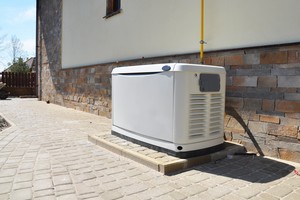Standby Generators for Clients in the Trenton Area

Purchasing and installing a standby generator for your Trenton property is a great way to prepare for big storms and power outages. Standby generators are popular because they provide uninterrupted backup power for days, and the skilled team at Parham Heating, Cooling, Plumbing & Electric, LLC, a local electrical service and HVAC contractor, is experienced at installing these generators.
If you’re looking for a generator for your Trenton home or business that provides convenience, value, and safety, reach out to a reputable electrical service and HVAC contractor like Parham Heating, Cooling, Plumbing & Electric, LLC to discuss the benefits of standby generators. Standby generators have the following characteristics:
- Installed permanently to concrete pads in yards
- Connected directly to electrical panels
- Powered by external fuel supplies
- Small and large options
- Wi-Fi and wireless monitor options
How Do Standby Generators Work?
When a trusted electrical service and HVAC contractor installs a standby generator on your Trenton property, the generator will have an automatic transfer switch that disconnects your home or business from your utility after an interruption in service is identified. Then the switch will turn on the generator and transfer the power to the building’s electrical panel. Your standby generator will have an internal combustion engine that is powered by natural gas, diesel, or liquid propane. When your utility’s power resumes, the generator’s switch will shut the system off and reconnect your building to the grid. Additionally, the transfer switch provides safety by preventing back-feeding electricity to the grid, a process which can ignite fires and endanger utility workers.
Choosing a Standby Generator for Your Home or Business
- Size, Power Ratings & Capacity - Large generators are rated by kilowatt (kW), a measure of electrical power output. The power capacity that your building requires can be determined by deciding if you want to power your HVAC unit during a power outage or not. If you do, check your HVAC unit’s data plate to identify the size in either tons or BTUs. There are 12,000 BTUs for each ton of capacity and 2.517 kilowatts of energy. Once you know the size of your HVAC unit, you can calculate how much power capacity your standby generator will need.
- Fuel Source – Standby generators up to 22kW will usually be powered by liquid propane or natural gas. Diesel-powered generators are often the most expensive type. If you’re unsure which fuel to use for your standby generator, consult with your electrical service and HVAC contractor.
- Transfer Switch – Select a transfer switch for your standby generator by checking the amperage of your electrical panel. Choose an amp switch that is the same as your home or business’s electrical panel.
Recent Generator Articles
-
Generators Can Save You From Disaster
A home generator in Trenton may not seem like something you should have to worry about, especially in today’s world where we have everything we could possibly want or need available at our fingertips. But how long would it take us to get uncomfortable if the […]
